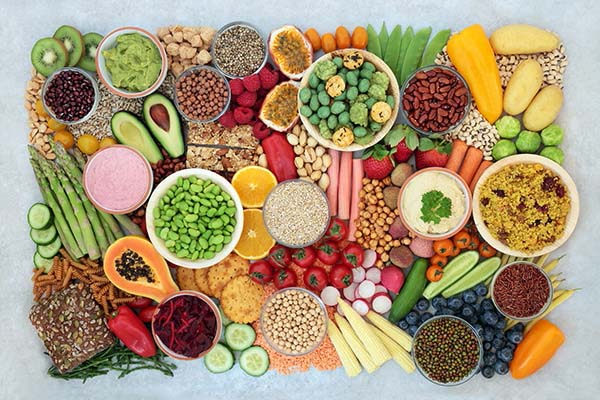Hidden Ingredients in Sugar Free Sauces: What to Watch Out For
All About Healthy Food: Advantages of Embracing Plant Based Choices
The discussion surrounding plant-based diets has gotten substantial focus over the last few years. Several people are discovering the possible health and wellness benefits, nutritional benefits, and ecological effects related to these dietary choices. As people come to be more knowledgeable about their food's influence on health and sustainability, inquiries develop regarding the functionalities of adopting such a lifestyle. What details adjustments can one anticipate, and exactly how might these choices improve not just individual wellness however also the earth's future?
Recognizing Plant-Based Diets
Numerous individuals link plant-based diets mostly with vegetarianism or veganism, these diets can encompass a large array of consuming patterns that focus on entire, minimally processed plant foods. Such diet plans typically consist of fruits, vegetables, entire grains, nuts, beans, and seeds, while restricting or getting rid of pet products. This adaptability enables individuals to tailor their dietary choices according to personal preferences and dietary demands. Some might take on a largely plant-based diet regimen while still occasionally consuming meat or dairy, frequently described as a flexitarian strategy. The focus remains on including more plant foods, which can cause a diverse array of flavors and meals. Understanding these numerous interpretations of plant-based eating is essential for valuing its availability and allure in contemporary food society.
Health Advantages of Plant-Based Foods
The health and wellness benefits of plant-based foods are considerable, supplying a nutrient thickness benefit that supports general well-being. Research study shows that these foods can boost heart wellness and play a necessary role in effective weight monitoring. By including extra plant-based choices, people might boost their dietary selections and advertise long-lasting wellness.
Nutrient Thickness Benefit
Nutrient thickness plays an essential role in the health benefits of plant-based foods, making them a compelling option for those seeking a balanced diet. Plant-based foods, such as fruits, vegetables, legumes, nuts, and whole grains, are usually rich in important vitamins, minerals, and anti-oxidants while being lower in calories. This high nutrient density allows people to take in less calories while still satisfying their nutritional requirements. Additionally, these foods are packed with dietary fiber, advertising digestive system health and wellness and aiding in weight monitoring. By including nutrient-dense plant-based choices, customers can boost their general wellness, support their body immune systems, and lower the danger of chronic conditions. Inevitably, the nutrient thickness of plant-based foods underscores their significance in a health-conscious lifestyle.
Heart Wellness Enhancement

Weight Management Assistance
In addition to advertising heart health and wellness, a plant-based diet regimen can substantially help in weight management. This nutritional approach stresses whole foods such as fruits, vegetables, vegetables, nuts, and whole grains, which are usually reduced in calories and greater in fiber compared to animal-based items. The high fiber content helps raise satiation, minimizing general calorie consumption. Moreover, plant-based diets are commonly rich in crucial nutrients while low in harmful fats, making it simpler to maintain a healthy weight. Plant Based Beef. Research suggests that people who embrace a plant-based lifestyle have a tendency to have reduced body mass indexes (BMIs) and experience more successful weight management compared to those who take in meat-heavy diet regimens. Consequently, accepting plant-based alternatives is a strategic option for efficient weight administration
Nutritional Value of Plant-Based Ingredients
Plant-based components are rich in essential nutrients, using a varied array of vitamins, minerals, and antioxidants that add to total health. A comparison of protein sources exposes that while pet items are often seen as remarkable, lots of plant-based alternatives give adequate healthy protein and other valuable compounds. Comprehending the nutritional value of these components can aid people make notified dietary options.
Crucial Nutrients in Plants
Nutrient-rich active ingredients located in plants supply a varied range of vital minerals and vitamins that contribute significantly to overall health and wellness. These active ingredients are rich in vitamins A, C, and K, which support immune feature, vision, and blood clotting, specifically. On top of that, plants offer essential minerals such as potassium, magnesium, and calcium, crucial for heart health, muscular tissue feature, and bone strength. The visibility of fiber in plant-based foods aids digestion and advertises a healthy intestine microbiome. Anti-oxidants, found perfectly in vegetables and fruits, aid battle oxidative stress and lower swelling. Several plant foods are low in calories yet high in nutrients, making them a superb option for those looking for to maintain a healthy and balanced weight while ensuring perfect nutrient consumption.

Contrasting Healthy Protein Resources
Healthy protein sources vary considerably in their nutritional profiles, with plant-based components using distinct advantages. Unlike pet proteins, which typically include hydrogenated fats and cholesterol, plant healthy proteins have a tendency to be lower in these unhealthy parts. Legumes, nuts, seeds, and entire grains are abundant in necessary amino acids, fiber, vitamins, and minerals. For example, lentils offer high protein content alongside substantial iron and folate, while quinoa is a total protein, supplying all 9 necessary amino acids. Additionally, plant-based healthy proteins are typically accompanied by anti-oxidants and phytochemicals that support general health and wellness. The shift to plant-based healthy protein sources not just enhances dietary intake yet likewise straightens with lasting nutritional practices, lowering environmental influence and advertising long-term wellness benefits.
Ecological Influence of Plant-Based Eating
As awareness of environment adjustment grows, several individuals are discovering sustainable dietary selections that can significantly lessen their environmental footprint. Plant-based consuming has become a significant factor to reducing greenhouse gas discharges, which are primarily related to livestock production. The cultivation of fruits, vegetables, beans, and grains generally needs fewer sources, such as water and land, compared to animal farming. Furthermore, plant-based diet regimens can cause decreased logging, as much less land is needed for grazing animals or expanding pet feed. By changing in the direction of plant-based options, consumers can support biodiversity and advertise much healthier ecological communities. Generally, embracing plant-based eating not only advantages personal wellness yet also represents a vital action toward environmental sustainability and conservation efforts.
Overcoming Common Misconceptions
While lots of people acknowledge the advantages of a plant-based diet plan, numerous misconceptions frequently discourage them from fully accepting this way of life. A typical belief is that plant-based diet plans lack sufficient protein; nonetheless, many plant sources, such as legumes, nuts, and tofu, supply enough protein. Additionally, some think that this diet plan is expensive, when in truth, staples like beans, rice, and seasonal vegetables can be fairly budget friendly. An additional misconception is that plant-based consuming is excessively restrictive, whereas it actually uses a diverse selection of tastes and foods. Several fret that a plant-based diet regimen may lead to shortages, yet with correct planning, people can obtain all essential nutrients, including minerals and vitamins, while enjoying a vast range of delicious meals.
Tips for Transitioning to a Plant-Based Lifestyle
Making the change to a plant-based way of life can be an enriching experience, though it commonly requires some advice to browse the initial modifications. Initially, individuals are encouraged to begin gradually, integrating even more fruits, vegetables, legumes, and entire grains into their meals while lowering meat and dairy products intake. Meal planning is crucial; preparing my link a weekly food selection can help ease the modification and protect against last-minute undesirable selections. Exploring cooking techniques and brand-new dishes can also preserve and improve the experience exhilaration about plant-based eating. In addition, joining assistance groups or communities can provide motivation and share valuable suggestions. Finally, staying educated concerning nourishment warranties balanced meals, avoiding shortages while fostering a healthy, gratifying plant-based way of life.
Delicious Plant-Based Dish Ideas
Discovering scrumptious plant-based meal concepts can inspire individuals to welcome a much more healthy diet regimen. One popular choice is a passionate quinoa salad, featuring cherry tomatoes, cucumber, and a tangy lemon-tahini clothing. Another favorite is a full-flavored lentil stew, packed with carrots, celery, and fragrant herbs, excellent for a comforting dinner. For morning meal, over night oats made with almond milk, chia seeds, and covered with fresh berries give a nutritious begin to the day. Furthermore, a lively vegetable stir-fry with tofu and a range of vivid veggies can be a fast yet pleasing meal. Luscious avocado salute on whole-grain bread, sprayed with seeds and spices, provides a basic yet savory treat. These dishes showcase the variety and richness of plant-based eating.

Frequently Asked Questions
Can a Plant-Based Diet Regimen Supply Enough Healthy Protein?
The concern of whether a plant-based diet regimen can give adequate protein is usual. Many resources, including beans, nuts, seeds, and entire grains, can meet healthy protein needs properly, supporting a healthy Your Domain Name and well balanced diet regimen for individuals.
Are Plant-Based Diet Regimens Appropriate for Children?
The viability of plant-based diets for youngsters depends upon careful preparation. Adequate nutrients need to be ensured, consisting of vitamins, healthy proteins, and minerals. With appropriate support, such diets can sustain healthy growth and growth in children.
How Do I Dine Out on a Plant-Based Diet regimen?
Dining out on a plant-based diet plan entails seeking dining establishments with varied food selections, requesting for adjustments, and discovering vegan-friendly choices. Planning ahead and connecting dietary preferences can enhance the eating experience while preserving nutritional options.
What Are Typical Irritants in Plant-Based Foods?
Common irritants in plant-based foods include soy, gluten, nuts, and seeds - BBQ Sauces. Individuals following a plant-based diet regimen needs to understand these irritants and review labels thoroughly to avoid adverse reactions and ensure secure informative post intake
Can Plant-Based Diets Help With Fat Burning?
Research study shows that taking on a plant-based diet regimen may facilitate weight-loss as a result of its generally reduced calorie density and higher fiber web content. This combination can boost satiation, helping individuals handle their calorie consumption efficiently. Many individuals connect plant-based diet plans generally with vegetarianism or veganism, these diets can encompass a broad variety of consuming patterns that prioritize whole, minimally processed plant foods. Nutrient thickness plays an important role in the health and wellness benefits of plant-based foods, making them a compelling choice for those seeking a well balanced diet regimen. Plant-based diet plans have actually been shown to substantially improve heart health, as they typically include aspects that support cardio feature. In enhancement to advertising heart health, a plant-based diet can significantly assist in weight monitoring. An usual belief is that plant-based diet plans do not have adequate healthy protein; nonetheless, numerous plant resources, such as vegetables, nuts, and tofu, offer sufficient healthy protein.